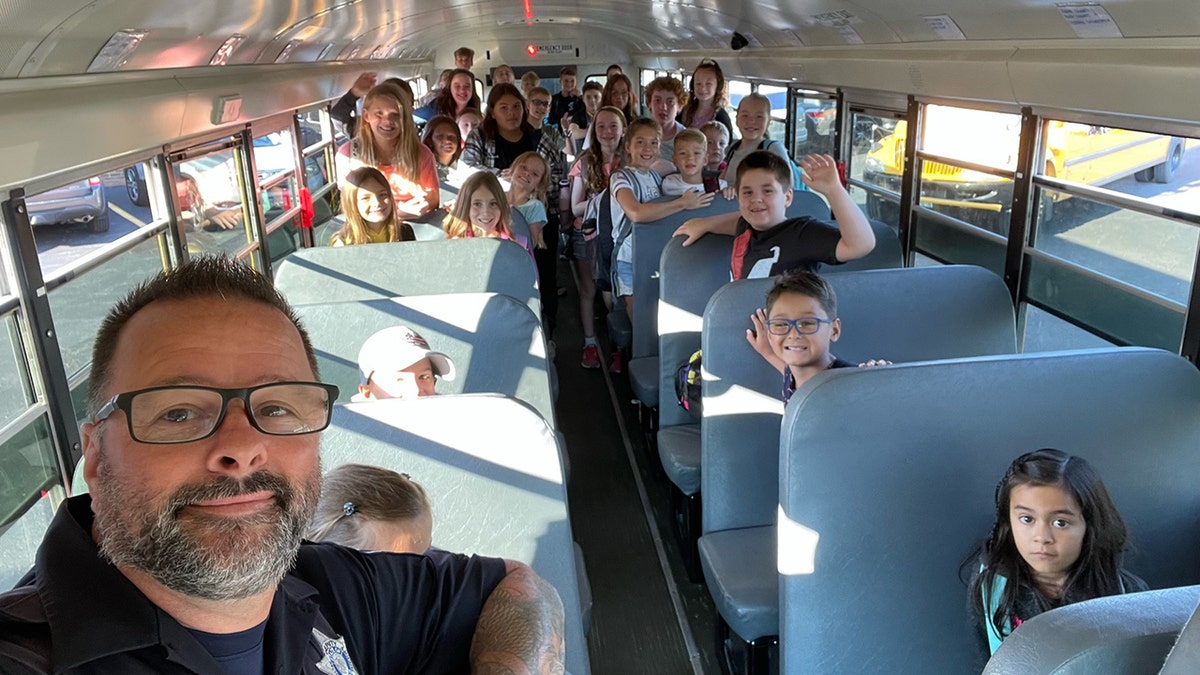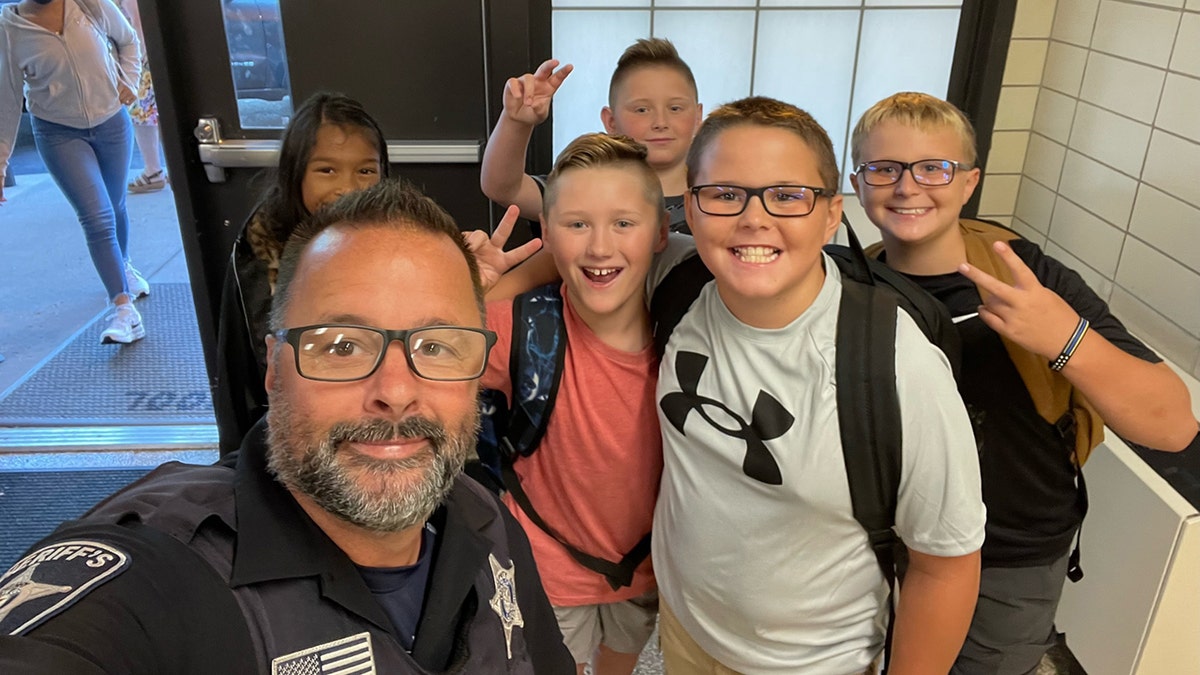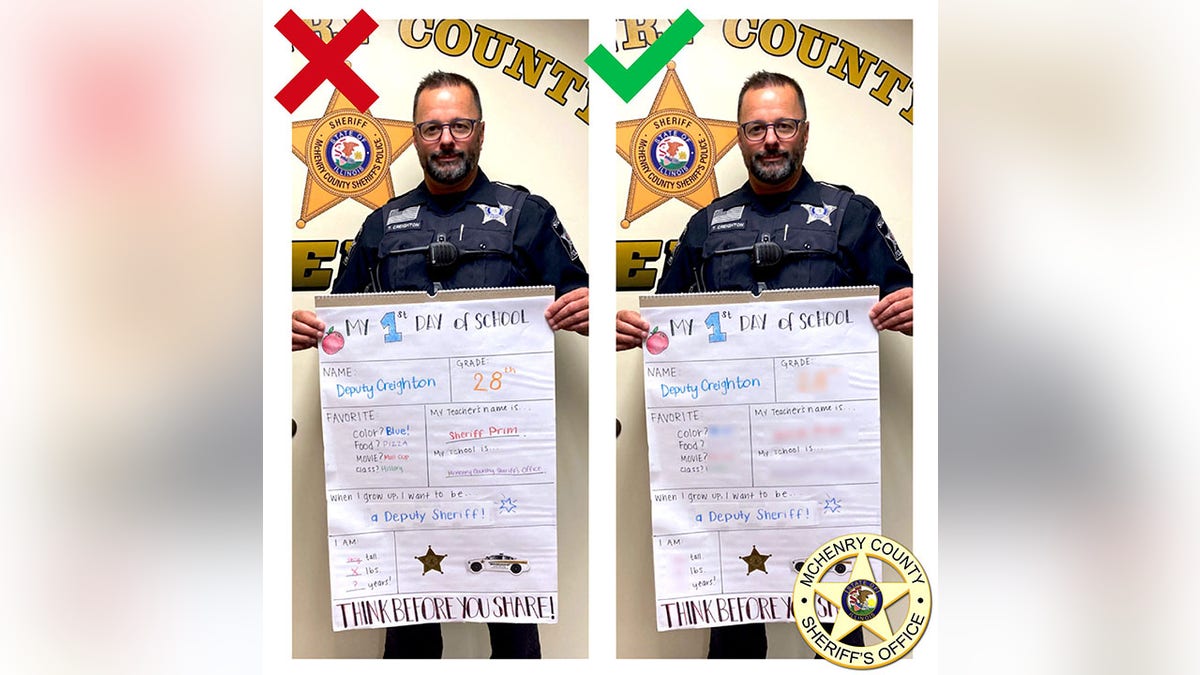Keeping your children safe online
The CyberGuy Kurt Knutsson joined 'Fox & Friends Weekend' to discuss the dangers of 'sharenting' and privacy concerns of posting kids' photos online.
As students adjust to returning to school this fall, law enforcement members and online safety experts are reminding parents to be cautious about the information they share on social media. It may give predators access to children and scammers access to personal information.
"We’re not saying not to share," Deputy Sheriff Tim Creighton of the McHenry County Sheriff’s Office in Woodstock, Illinois, recently told Fox News Digital.
"I have people to this day on my feeds. They are sharing way too much information."
"Less is better," he said. "Your close friends and family know the important details about your kids, such as the town they live in, the school they go to, their full name. Strangers don’t need to know that."
Last month, the McHenry County Sheriff’s Office shared a viral Facebook photo of Creighton demonstrating exactly what he means. He held up a sign meant to celebrate the first day of school — one that shared far too much personal information.
"It’s that time of year!" the sheriff’s office captioned the image.
"Don’t give predators, scammers or thieves information that can be used to harm your children, family or finances."
The first warning was posted Aug. 8, 2021 — and was shared by 135,000 Facebook users.
ONLINE DANGERS ARE RAMPANT FOR KIDS TODAY — WHY PARENTS MUST KEEP THEM CYBER SAFE
"It protects the child, but we also did it for the parents," Creighton told Fox News Digital in 2021.
"A lot of people were commenting [how] they never, ever thought about it… It was an important safety message created in an engaging way."
Creighton, who is also a school resource officer, told Fox News Digital the viral image has been publicly posted and reposted as a reminder to parents and caregivers to "think before you share."

Deputy Sheriff Tim Creighton of the McHenry County Sheriff's Office takes selfies with students on the first day of school in Illinois on Aug. 23, 2022. (Deputy Sheriff Tim Creighton/McHenry County Sheriff’s Office)
"Cybersecurity, internet passwords, fraud, sex trafficking — there's a lot," Creighton has said of the various reasons that certain details should be omitted.
The Facebook snapshot shows Creighton holding a poster titled, "My first day of school."
The left side shares mock information, such as the child's name, age, grade, teacher and name of school. The right-side image has those personal details blurred out — clearly suggesting that it’s unsafe to include these details in a picture that's shared on social media.
"Your close friends and family know the important details about your kids, such as the town they live in, the school they go to, their full name. Strangers don’t need to know that."
Creighton said the following details should be left out when sharing photos or life updates throughout the school year and beyond: school name, age, teacher's name and grade, identifying features (height, weight, etc.) and overly personal information such as passwords or security question answer.
"This information… can all be used by predators, scammers and other people looking to endanger your child, family or finances," the Facebook caption states.
"No matter your privacy settings or friends list, it's best to keep personal information on the internet to the bare minimum."
BACK-TO-SCHOOL MENTAL HEALTH: HOW TO CHECK IN WITH YOUR KIDS BEFORE PUTTING THEM ON THE SCHOOL BUS
Often, people will use their child's name, date of birth and more information in passwords, said Creighton. Identity theft can occur if too much is given away online.
To amplify this year's message about internet safety, the McHenry County Sheriff’s Office created a new post in August. It advises parents about what to look for on their kids' Instagram accounts to ensure privacy.
He shared these tips:
1. Is the account private — and not viewable to those who aren't approved followers?
2. What is the child's user name? Does it give away any important information?
3. How many followers do the kids have and who are they following? Are these strangers or people they know in real life?
4. Is their profile picture appropriate for their age? Does it give away any important information? This is viewable to the public no matter what.
5. What information is in their bio? This information is also viewable to the public.
Donna Rice Hughes is an internet safety expert and president and CEO of the Reston, Virginia-based Enough Is Enough, a nonprofit group that is trying to maximize internet safety for kids and prevent online exploitation.
Hughes echoed the advice from the sheriff’s office, warning families against oversharing (both for children and parents), even if accounts are set to "private."
"Sharing personally identifiable information on social media about a child may have unintended consequences, including being used by a sexual predator or trafficker to track or harm a child," Hughes told Fox News Digital.
"In addition to using privacy settings and parental controls, parents are encouraged to teach their children to be as anonymous as possible in the digital world. [They should] model that same behavior themselves and build an atmosphere of trust and accountability with their child, communicating regularly about device use and online relationships."
Think twice before sharing that First Day of School photo! While it may feel obligatory to do so, inadvertently sharing too personally identifiable information about your child on social media comes with risks! Visit https://t.co/Gz8Www6NYs for more internet safety tips! pic.twitter.com/FU1JQD0rS6
— Enough Is Enough (@EIETweets) August 19, 2022
Enough Is Enough shared a safety message on its webpage, encouraging families to use parental controls as an added layer of protection on all internet-enabled devices, including "smartphones, computers, tablets and gaming systems."
The organization said parents can use parental control tools to do the following:
1. Set filters to block inappropriate content, including pornography.
2. Set monitoring/accountability tools to track apps usage, website visits, emails, messaging and other internet activities. Monitoring also provides detailed reports on the child’s online activities.
3. Set time limits.
4. Block inappropriate apps or games.
5. Set up parent-approved buddy and gamer lists to limit those with whom the child can communicate.

Deputy Sheriff Tim Creighton poses with students in Illinois. Creighton is a school resource officer and visits schools to talk with kids about social media, internet safety and stranger danger. (Deputy Sheriff Tim Creighton/McHenry County Sheriff’s Office)
On Sunday, award-winning national tech contributor Kurt Knutsson, aka The CyberGuy, appeared on "Fox & Friends Weekend" to address "sharenting" — the practice of parental sharing of photos and videos of their kids on social media.
Not only can oversharing the details about children and their schools potentially harm them, but Knutsson agreed that revealing too much about birthday parties, soccer games, etc., can present problems.
PARENTS ARE WARNED CHILD KIDNAPPINGS MOST LIKELY ATTEMPTED DURING THESE DISTINCT TIMES OF DAY
"Sharenting [is] this idea that has been coined that has to do with parents," Knutsson said. "Big tech has really just taught us to just constantly take photos, upload them, share moments of our kids, our whole family's lives."
Some parents, said Knutsson, may take sharing "to the extreme," and many aren't realizing the dangers or risks that may be involved.
The dangers of 'sharenting' and privacy concerns of posting kids' photos online. How to protect your kids and grandkids:https://t.co/m3uJEBaFFU#privacy #socialmedia #parenting #tech #foxandfriends #foxnews pic.twitter.com/ZInv9URXGP
— Kurt Knutsson (@cyberguy) September 18, 2022
"On the lesser end, you have advertisers that are using AI software. They are building profiles of every human being they can get their hands on to understand, ‘Wow, how can we get Rachel? How can we get Rachel’s kids to respond to what we want to sell as advertisers?'" he said.
"We get it… Technology advances and that’s part of life. But then you have the fact that that AI software is now on the black market and the dark web, where people now on the bad side of this are using that to build profiles of people, and they don’t care how old they are."
CLICK HERE TO GET THE FOX NEWS APP
Knutsson said the software has the capability to get "crazy specific."
This technology then picks up where a person lives, or where and when a child attends sports practice, for example.

Deputy Sheriff Tim Creighton poses as if it's his first day of school in 2021 to show parents what they should not reveal about their children, as it could potentially make them a target for predators and online scammers. The McHenry County Sheriff's Office shared this image to Facebook last month as an important safety reminder. (McHenry County Sheriff's Office)
Knuttson offered these important tips: Use antivirus protection, avoid sharing every moment related to your children, check social media privacy settings and request that your loved ones either stop sharing or ask your permission before they share information and/or your child’s photo.
Creighton agreed.
CLICK HERE TO SIGN UP FOR OUR LIFESTYLE NEWSLETTER
"Even your friends may not have the same privacy settings that you do," Creighton said, adding that parents should remind grandparents to check their own privacy settings before resharing a post or image.
"You may have pretty tight security settings, but they [might not] — so be cautious."










































